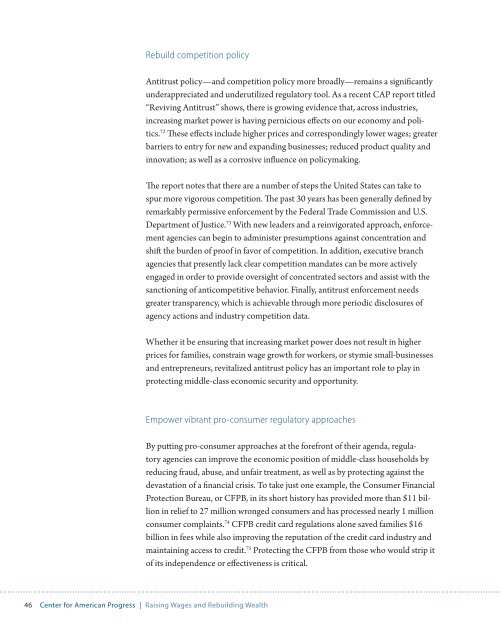AGENCY/PHOTOGRAPHER
RaisingWagesRebuildingWealth
RaisingWagesRebuildingWealth
Create successful ePaper yourself
Turn your PDF publications into a flip-book with our unique Google optimized e-Paper software.
Rebuild competition policy<br />
Antitrust policy—and competition policy more broadly—remains a significantly<br />
underappreciated and underutilized regulatory tool. As a recent CAP report titled<br />
“Reviving Antitrust” shows, there is growing evidence that, across industries,<br />
increasing market power is having pernicious effects on our economy and politics.<br />
72 These effects include higher prices and correspondingly lower wages; greater<br />
barriers to entry for new and expanding businesses; reduced product quality and<br />
innovation; as well as a corrosive influence on policymaking.<br />
The report notes that there are a number of steps the United States can take to<br />
spur more vigorous competition. The past 30 years has been generally defined by<br />
remarkably permissive enforcement by the Federal Trade Commission and U.S.<br />
Department of Justice. 73 With new leaders and a reinvigorated approach, enforcement<br />
agencies can begin to administer presumptions against concentration and<br />
shift the burden of proof in favor of competition. In addition, executive branch<br />
agencies that presently lack clear competition mandates can be more actively<br />
engaged in order to provide oversight of concentrated sectors and assist with the<br />
sanctioning of anticompetitive behavior. Finally, antitrust enforcement needs<br />
greater transparency, which is achievable through more periodic disclosures of<br />
agency actions and industry competition data.<br />
Whether it be ensuring that increasing market power does not result in higher<br />
prices for families, constrain wage growth for workers, or stymie small-businesses<br />
and entrepreneurs, revitalized antitrust policy has an important role to play in<br />
protecting middle-class economic security and opportunity.<br />
Empower vibrant pro-consumer regulatory approaches<br />
By putting pro-consumer approaches at the forefront of their agenda, regulatory<br />
agencies can improve the economic position of middle-class households by<br />
reducing fraud, abuse, and unfair treatment, as well as by protecting against the<br />
devastation of a financial crisis. To take just one example, the Consumer Financial<br />
Protection Bureau, or CFPB, in its short history has provided more than $11 billion<br />
in relief to 27 million wronged consumers and has processed nearly 1 million<br />
consumer complaints. 74 CFPB credit card regulations alone saved families $16<br />
billion in fees while also improving the reputation of the credit card industry and<br />
maintaining access to credit. 75 Protecting the CFPB from those who would strip it<br />
of its independence or effectiveness is critical.<br />
46 Center for American Progress | Raising Wages and Rebuilding Wealth


